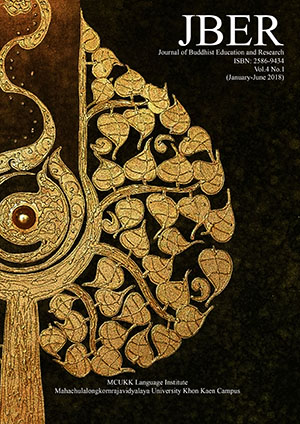Continental Philosophy and Buddhist Texts
Keywords:
Continental ,Philosophy, Buddhist TextsAbstract
Some of the concepts contained in the Sanskrit and Pali Buddhist texts do not have clear equivalents in the English language. Behind each language lies a great background of cultural symbolism and linguistic usage. Terms such as ‘insight’, ‘consciousness’ and even ‘spirituality’ are understood in the West according to a cultural heritage that has its roots firmly embedded in Judeo-Christian narratives and cosmologies.
However, ‘continental philosophy’, with its notions of the ‘deconstruction’ of culturally constructed ideas and the transcendence of the symbolic self, are related directly to Buddhist epistemology. The Pali term anatta or ‘non-self’ resonates strongly with the postmodern issue of the symbolic self, an illusory sense of self that emerges from a radically objective interpretation of the world. Both Buddhism and continental philosophy share the idea that all perspectives are conditioned viewpoints. The Pali term saṅkhārā expresses this notion of conditioning and the five aggregates of existence (pañcupādānakkhandā) demonstrate the way this conditioning takes place by means of the human tendency to cling to sensory objects and to identify with personal feelings and thoughts.
Many Buddhist texts employ narrative strategies such as metaphor, analogy and semiotic flow to express contemplative experiences and levels of consciousness that cannot be adequately described in the third-person oriented, propositional language of Western academia. Academic terminology is dominated by a thirst for objective facts because its roots still lie in a Cartesian logico-empiricism. It is therefore necessary to consider the great distance between the linguistic and narrative foundations of Buddhism and present-day Western culture: it becomes necessary to find an appropriate terminology or ‘language’ to fruitfully interpret the wisdom of these ancient documents. This paper will argue that the form of expression employed by continental philosophers such as Nietzsche, Heidegger, Foucault and Derrida is just such a language.
References
Meditation and Consciousness. MIT Press : Cambridge.
Barthes, Roland. (1957). Mythologies, Éditions de Seuil : Paris.
Brooke, Roger. (2000). Pathways into the Jungian World: Phenomenology
and Archetypal Psychology. Routledge : London.
de Cervantes, Miguel. (1987). „Don Quixote de la Mancha‟. Ediciones
Cátedra : Madrid.
Conze, Edward. (1973). The Perfection of Wisdom in Eight Thousand Lines.
Bolinas : Four Seasons Foundation/ Book People Berkeley.
Conze, Edward. (1973). ‗The ―Heart of Perfect Wisdom‖ in 25 Lines‘ in The
Short Prajnaparamita Texts, Luzac & Company : London.
Conze, Edward. (1973). ‗The Diamond Sutra‘, in The Short Prajnaparamita
Texts. Luzac & Company : London.
Derrida, Jacques. (1982). ‗White Mythology: Metaphor in the Text of
Philosophy‘, in Margins of Philosophy, Harvester Wheatsheaf :
Hemel Hempstead.
Dogen. (1986). ‗Genjokoan‘, in Thomas Cleary [trans] Shobogenzo: Zen
Essays by Dogen. University of Hawaii Press : Honolulu.
Foucault, Michel. (1966). Chapter 2, ‗La Prose du Monde‘. in Les Mots et les
Choses: Une Archéologie des Sciences Humaines, Éditions
Gallimard : Paris.
Foucault, Michel. (1966). Les Mots et les Choses: Une Archéologie des
Sciences Humaines. Éditions Gallimard : Paris.
Heidegger, Martin. (1962). Being and Time, [trans] John Macquarrie and
Edward Robinson. Blackwell : Oxford.
Heidegger, Martin. (1991). Nietzsche: Volumes One and Two: The Will to
Power as Art and The Eternal Recurrence of the Same, [trans] David
Farrell Krell. HarperCollins: New York.
Hixon, Lex. (1993). Mother of the Buddhas. Quest Books : Wheaton.
James, William. (1982). Varieties of Religious Experience. Penguin : New
York.
Kristeva, Julia. (1982). Powers of Horror: An Essay on Abjection. Columbia
University Press : New York.
Kristeva, Julia. (1986). ‗Revolution in Poetic Language‘, [trans] Margaret
Waller, in Tori Moi [ed]. The Kristeva Reader. Blackwell : Oxford.
McNay, Lois. (1994). Foucault: A Critical Introduction. Polity : Cambridge.
Monier Monier-Williams. (2002) A Sanskrit-English Dictionary. Motilal
Banarsidas : Delhi.
Petitmengin-Peugeot, Clair. (1999). ‗The Intuitive Experience‘, in Varela and
Shear [eds], The View From Within: First-Person Approaches to the
Study of Consciousness. Imprint Academic : Thorverton.
Rhys Davids and William Stede. (1994). Pali-English Dictionary, Munshiram
Manoharlal : New Delhi.
Sangharakshita. (1993). A Survey of Buddhism. [7th ed] Windhorse :
Glasgow.
Shantideva. (1997). Bodhicaryavatara (The Way of the Bodhisattva), [trans]
Padmakara Translation Group. Shambala Publications : Boston
Varela, Francisco J. with Evan Thompson and Eleanor Rosch. (1991). The
Embodied Mind: Cognitive Science and Human Experience, MIT
Press : Cambridge.
Vipassana Research Institute. (1996). Mahāsatipatthāna Sutta. Vipassana
Research Publications : Seattle.
Wilson, Jeff. (2017). Narrative Form in the Writing of Meditation Manuals,
[in process] DIRI Journal, Vol. 3. Sydney.





